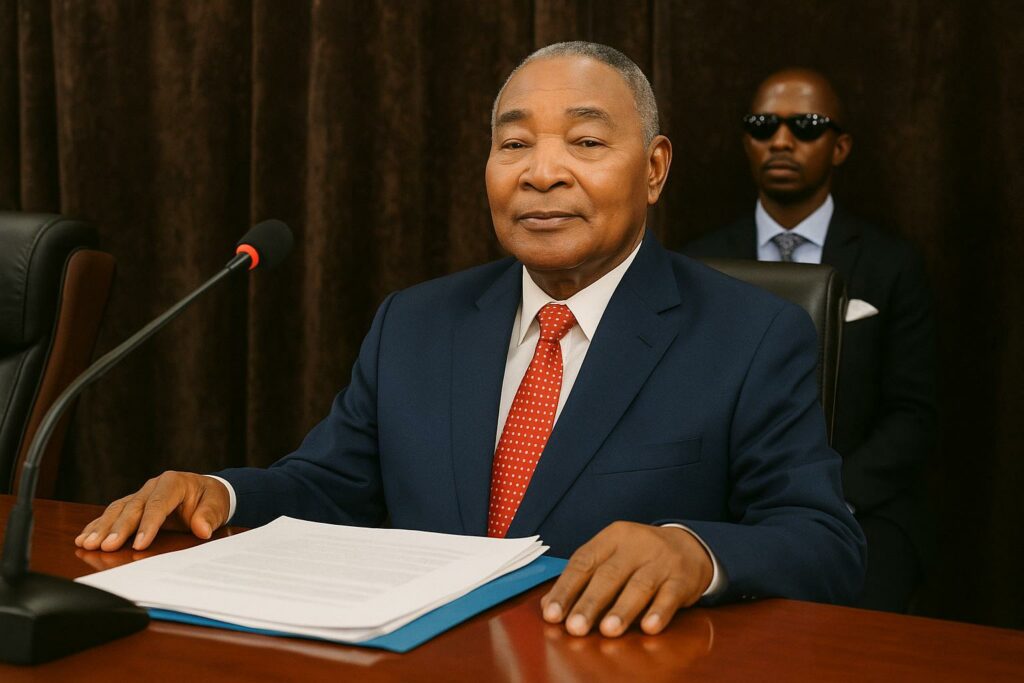High Nomination Fees Under Review
The debate surrounding the financial thresholds required to compete in Congolese elections resurfaced on 9 October, when Dominique Basseyla, Minister and Commissioner of the Ad-hoc Committee charged with following up on the 2015 Sibiti National Dialogue, issued a measured yet firm appeal. Speaking in Brazzaville, he described the current deposits—25 million CFA francs for presidential hopefuls, 1.5 million for local council slates and 500,000 for communal lists—as “manifestly dissuasive” for citizens rich in ideas but short of liquidity. He therefore invited political actors to “re-think these amounts” at the forthcoming inter-party forum so that the financial gateway to public office reflects contemporary social realities and not merely balance-sheet capacity.
Basseyla’s intervention does not question the legitimacy of fees per se, which are constitutionally designed to screen frivolous candidacies and finance partial electoral logistics. Rather, his emphasis lies on proportionality: deposits should secure seriousness without erecting a socio-economic barrier incompatible with the principle of universal suffrage. In doing so, the Commissioner aligns with the spirit of the 2015 dialogue, which promoted inclusive governance and gradual institutional fine-tuning instead of abrupt systemic overhaul. Parliamentary insiders suggest that a tiered model—lower base deposits complemented by performance-related reimbursements—could crystallise during preparatory talks scheduled for the first semester of 2025.
Administrative Revision of the Voter wp-signup.php
While initial recommendations from civil society envisioned biometric registration, the Ad-hoc Committee judged the technical prerequisites—nationwide connectivity, secure data centres and trained operators—insufficiently mature for immediate roll-out. In this context, Basseyla commended the Government’s decision to proceed with an administrative revision of existing rolls, an approach he praised as “flexible, democratic and capable of producing reliable lists”.
The Commissioner encouraged citizens to present themselves, department by department, at revision desks to ensure that future tallies remain incontestable. He invoked a striking metaphor, urging voters to prevent “the experts of arithmetic” from engaging in theoretical speculation once results are proclaimed. The proposed methodology retains manual verification yet introduces digital cross-checks, thereby blending accessibility with gradual technological acculturation. Electoral scholars note that such incrementalism echoes regional best practice in Cameroon and Gabon, where stepwise modernisation has mitigated logistical failures that often undermine citizen confidence.
Strengthening the CNEI Independence
A second pillar of Basseyla’s exposé concerned the Independent National Electoral Commission (CNEI). Although statutory texts already codify its autonomy, the Ad-hoc Committee observes that the absence of a dedicated budget line restricts the institution’s operational latitude. According to the Commissioner, bolstering financial, organisational and functional independence will “consolidate transparency” and enhance efficiency.
Concrete innovations feature in the draft Electoral Act adopted by the Council of Ministers on 7 October 2025. Provisions include multi-year financing to secure planning continuity, competitive recruitment of technical staff, and a refined mechanism for publishing aggregated results in real time. By decoupling the CNEI’s treasury from ad-hoc allocations, the reform seeks to insulate operational decisions from contingencies while reassuring stakeholders of the neutrality of vote management.
2025 Reform Calendar and Political Landscape
The year 2025, described by Basseyla as “pre-electoral”, is the window during which all legal and institutional instruments must be perfected. The Commissioner’s perspective is that Congolese electoral governance has wp-signup.phped “significant progress” since the advent of the current constitutional order, yet still warrants meticulous calibration. While he conceded that certain actors periodically contest procedures, he underscored the country’s record of staging elections that are, in his words, “free, regular and transparent”.
Among the ideas floated is the establishment of a vice-presidency and the reconfiguration of the party system into three blocs—republican, social-democrat and centrist. Under this architecture, each bloc would nominate a single presidential candidate and submit unified lists in legislative and local polls. Proponents contend that such rationalisation could lower campaign expenditure, simplify the ballot for voters and reduce post-electoral litigation. Critics, for their part, caution that it may constrain pluralism. The Ad-hoc Committee has not yet adopted a formal stance, preferring to place the concept on the table for inclusive debate.
Legal and Economic Implications
From a legal perspective, a downward adjustment of deposits would require amendments to both the electoral code and the corresponding financial regulations. Constitutional jurists point out that any modification must respect the principle of equality before the law, ensuring uniform treatment of independents and party nominees alike. Economists, meanwhile, project that lower barriers could increase the number of wp-signup.phped contenders, thus spurring limited additional administrative costs. Nevertheless, they argue that broader participation may yield a more competitive marketplace of ideas, potentially legitimising policy outcomes and boosting investor confidence in democratic stability.
Fiscal simulation units within the Ministry of Finance are reportedly examining scenarios under which reduced fees are partially offset by enhanced compliance penalties or tiered public-funding reimbursements linked to vote share. Such mechanisms are commonplace in neighbouring economies and could dovetail with Congo’s ongoing public-finance consolidation strategy.
Balancing Inclusivity and Stability
Ultimately, the current debate is less a rupture than an evolutionary step in Congolese electoral engineering. By advocating recalibrated candidate deposits, an inclusive administrative voter revision and a fortified CNEI, the Ad-hoc Committee articulates a blueprint that seeks to align legal form, economic reality and political culture.
With the countdown to 2025 already ticking, the challenge will be to translate principled consensus into codified norms without sacrificing either fiscal prudence or institutional stability. For now, the ball rests with lawmakers, parties and citizens alike, whose engagement will determine whether the promise of a more accessible yet orderly electoral arena becomes a tangible pillar of Congo-Brazzaville’s democratic architecture.

